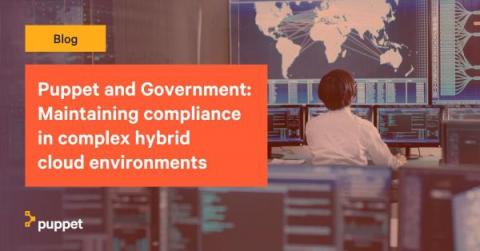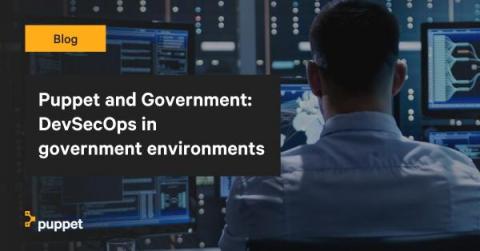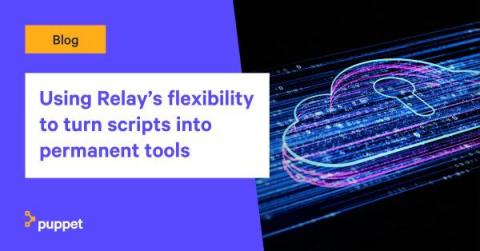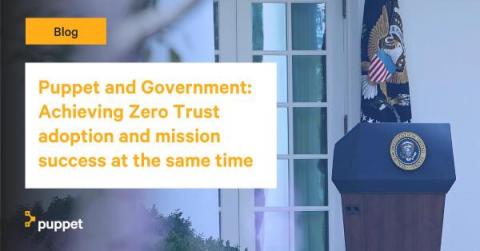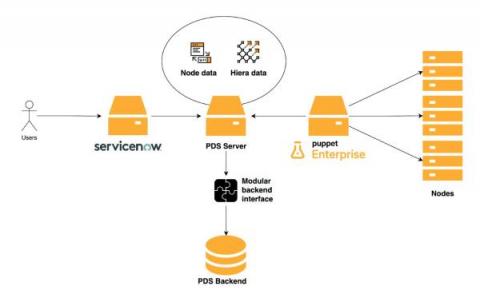Operations | Monitoring | ITSM | DevOps | Cloud
Puppet
Puppet and Government: Adopting infrastructure as code
Government agencies are facing a rising need for changes to their IT infrastructure. This need is becoming even more urgent as they continue to migrate operations to the cloud. Leveraging modern cloud applications and resources within an existing legacy agency environment requires IT agility to maintain the balance of security while keeping pace with an agency’s mission.
Puppet and Government: Maintaining compliance in complex hybrid cloud environments
This blog is the third in a four-part series about how Puppet can help government agencies meet compliance and security requirements. Read the second post here. Government agency IT departments know that migrating applications to the cloud can improve efficiency, increase visibility, and reduce costs. They also recognize the value in keeping some operation resources on-premises.
Puppet and Government: DevSecOps in government environments
This blog is the second in a four-part series about how Puppet can help government agencies meet compliance and security requirements. Read the first post here. Zero Trust is a strategy created to combat system intrusions through a “never trust, always verify” model. DevSecOps is a collaborative software development strategy that integrates development, security, and operations practices into a continuously evolving lifecycle.
Using Relay's flexibility to turn scripts into permanent tools
Relay’s inputFile capability is handy because it allows you to use familiar programming languages to get custom solutions working quickly. Using an inputFile with Relay is as easy as writing a script in bash, Python, or Powershell, and storing it in a remote Internet-accessible repository like GitHub. Let’s see how Relay enhances our daily driver skillset to solve problems quickly and reliably with minimal code.
Puppet and Government: Achieving Zero Trust adoption and mission success at the same time
Government agencies have been working diligently to comply with the 2021 Executive Order on Improving the Nation’s Cybersecurity. The Executive Order (EO) addresses cybersecurity issues by imposing a new series of federal-wide Zero Trust mandates. Agencies were required to submit their plan development and cloud migration path reporting by July and August of 2021, with more deadlines on the horizon.
Introducing Puppet Data Service
I work on the Solutions Architects team here at Puppet. We are sometimes the first line of defense in solving some of our customers' most challenging or unique problems, and every so often, we see trends in problems that we'd previously considered to be edge cases. For example, cCustomers often ask us two questions: How can we connect external configuration data to Puppet? How can we speed up changing their own configuration for service owners without onboarding them to Git approval processes?
Configuring Puppet's Policy-based autosigning
Enhance your Puppet Enterprise support workflow with pe_status_check
puppetlabs-pe_status_check is a new supported module for Puppet Enterprise. It provides a series of indicators of system status that the Puppet Support team has determined to avoid support incidents or outages. Utilizing this module and the accompanying documentation will allow the user to craft preventative maintence workflows and, should it still be required, increase the quality of information in any support ticket, to help decrease the time to resolution for any incident.
Lockless code deploys in Puppet Enterprise & Continuous Delivery for PE
Your Puppet Enterprise (PE) installation’s primary job is to compile catalogs and send them to agents to be enforced. When you deploy code, all catalog compilation stops and waits for the code deploy to complete. This impacts performance in any installation, and the impact escalates with more frequent code deployments. Code deployments usually increase when you use Continuous Delivery for Puppet Enterprise, making the impacts of stopped catalog compilations even more apparent.




